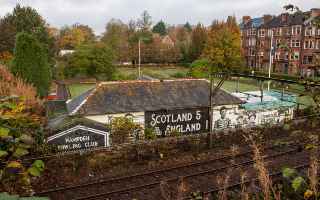Scotland: Historic site of the first international football match faces redevelopment
source: StadiumDB.com; author: Paulina Skóra
 The world’s first international football stadium could soon vanish from Glasgow’s landscape. The original Hampden Park, in the south of the city and now home to a bowling club, is facing financial difficulties and the threat of closure.
The world’s first international football stadium could soon vanish from Glasgow’s landscape. The original Hampden Park, in the south of the city and now home to a bowling club, is facing financial difficulties and the threat of closure.
Advertisement
Football’s cradle in danger
If the club folds, the land would return to Land Property Glasgow and could be redeveloped for commercial use, including housing or parking. For local football fans, it would be a huge loss — this is where modern football was born. Queen’s Park played here from 1873 to 1883, hosting Scottish Cup finals and Scotland’s first international matches, including the famous 5-1 win over England in 1882.
In 2021, archaeological surveys confirmed remnants of the old stadium. At the time, Scottish teams usually played on adapted cricket grounds; Hampden Park was the first purpose-built football venue. Historian Lindsay Hamilton, who leads tours across the three historic stadium sites, notes that Hampden became the prototype for modern arenas: stands, toilets, turnstiles, and even season ticket systems (membership books
).
Bowling Club on the edge
After Queen’s Park moved in 1884, the site became home to Hampden Bowling Club, active since 1905. But dwindling membership — now just around 50 — has put the club at risk. The board plans an extraordinary general meeting and intends to resign by February 2026. Without new leadership, the club will be dissolved and the land returned to city control.
Board member David Coutts highlights that, despite the lack of spectacular architecture, the site has immense historical importance: from this simple Glasgow field, the world’s most popular sport grew. He adds that the short-term lease prevents the club from securing funding or grants for restoration.
Tweet mwantola https://x.com/ktleearowsmith/status/1980242916263002434
— ktleearowsmith (@ktleearowsmith) June 6, 2025
Hope in the local community
The club hopes the local community can take over the site, turning it into a social hub for meetings, events, or film screenings. They don’t want Hampden to share the fate of other bowling clubs, which were turned into car parks or apartment blocks.
The magic is still there
For Hamilton, preserving the old Hampden Park is more than saving green space. You can still feel the spirit of the time,
she says. Many similar sites have been lost, but in Glasgow, you can still stand on the ground where modern football began. If this were London, Rio, or Buenos Aires, there’d be a museum here,
she adds. For her, Hampden Park deserves protection and cultural recognition.
Advertisement
 StadiumDB
StadiumDB